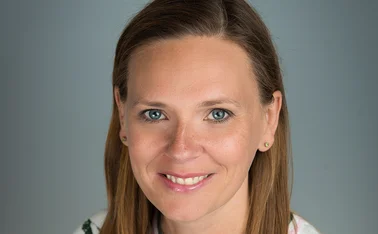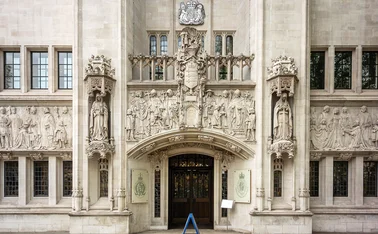
Coronavirus the 'disease equivalent' of the Great Storm of 1987, Supreme Court hears

The Financial Conduct Authority’s counsel today likened the spread of coronavirus to the Great Storm of 1987, appearing in front of the Supreme Court for the third day of the business interruption test case appeal.
Colin Edelman, QC, representing the regulator in the BI test case proceedings against insurers, took the stand again today, having begun yesterday afternoon, to rebuff insurer appeals and put the FCA’s case forward.
Coronavirus is the “disease equivalent of the 1987 storms”, Edelman told Lords Briggs, Hamblen, Hodge Leggatt and Reed who will pass judgment on the case.
The extratropical cyclone of 1987, known as the Great Storm, swept the South East of England leaving a path of destruction in its wake. 18 people were killed in the storm, with 1.5 million trees felled and 250,000 homes left without power.
The insurance claims cost was £1.4bn, with RMS having estimated that in today’s money it would have cost up to £3.57bn. The storm infamously caught insurers unprepared.
Disease
Before launching into insurer-specific appeal attacks, Edelman rounded out some general arguments on the character of disease risk, following heads butting over trends clauses the previous day.
The FCA’s lawyer argued that the insurers in the case “could have but did not restrict the ambit of application to a specified list of diseases”.
Edelman pointed to the wording of Ecclesiastical policies. The insurer was a party to the High Court proceedings where it was found it was not liable for BI pay outs, with the FCA having chosen not to contest this ruling.
“One of reasons we lost on Ecclesiastical was the exclusion that limited disease cover to a specified list of diseases,” Edelman noted.
He continued: “These insurers chose to take the plunge and offer insurance against whatever disease might show up.”
Edelman further argued that diseases were not expected to “spread in” or be “confined into a particular neat circle”, as per insurers’ specified one-mile or 25-mile radius clauses.
And the FCA’s counsel alleged that insurers should have known there was precedent for BI due to disease outbreaks.
He gave the example of Beijing’s public entertainment sites being shut down for six weeks due to the threat of Sars, as well as alluding to the 2009 Mexico Swine Flu outbreak that saw schools and museums close, followed by a five-day national lockdown.
Edelman stated: “Yes [this was] unprecedented in UK but there were precedents elsewhere and the statutory powers were there to do the same thing in this country.”
Edelman further argued: “If because of the nature of the risk if the authority did react to the disease outbreak they would be reacting to the outbreak as a whole. That must have been appreciated by the parties that that was what would happen. Even if the outbreak included localities within the insured’s radius the pattern of the outbreak would be unpredictable.
“These policies, even the one-mile radius ones, are contemplating the disease [affecting a wider] area.
“If they had wanted cases in a policy area to be the real cause [of gov action] then one might have expected they would specify that.
“Some don’t even require cases of the disease to be symptomatic. For those that do, symptomatic is enough.”
“Cherrypicking”
Moreover, Edelman rehashed earlier accusations that insurers with hybrid or composite clauses were “cherrypicking”.
And he argued that: “We say that on analysis interruption and interference are an element of the peril because they are addressing an operational impact on the business.”
The Supreme Court appeal began on Monday 16 November and is expected to wrap up on Thursday 19 November.
Insurer parties to the case are Arch, Argenta, Hiscox, MS Amlin, QBE and RSA. The FCA is also appealing on some grounds, as is intervener the Hiscox Action Group.
Ecclesiastical and Zurich were both named as defendants in the original High Court action. However, the regulator has not chosen to appeal the verdict that their selected policies should not pay out for BI losses.
Only users who have a paid subscription or are part of a corporate subscription are able to print or copy content.
To access these options, along with all other subscription benefits, please contact info@postonline.co.uk or view our subscription options here: https://subscriptions.postonline.co.uk/subscribe
You are currently unable to print this content. Please contact info@postonline.co.uk to find out more.
You are currently unable to copy this content. Please contact info@postonline.co.uk to find out more.
Copyright Infopro Digital Limited. All rights reserved.
As outlined in our terms and conditions, https://www.infopro-digital.com/terms-and-conditions/subscriptions/ (point 2.4), printing is limited to a single copy.
If you would like to purchase additional rights please email info@postonline.co.uk
Copyright Infopro Digital Limited. All rights reserved.
You may share this content using our article tools. As outlined in our terms and conditions, https://www.infopro-digital.com/terms-and-conditions/subscriptions/ (clause 2.4), an Authorised User may only make one copy of the materials for their own personal use. You must also comply with the restrictions in clause 2.5.
If you would like to purchase additional rights please email info@postonline.co.uk







